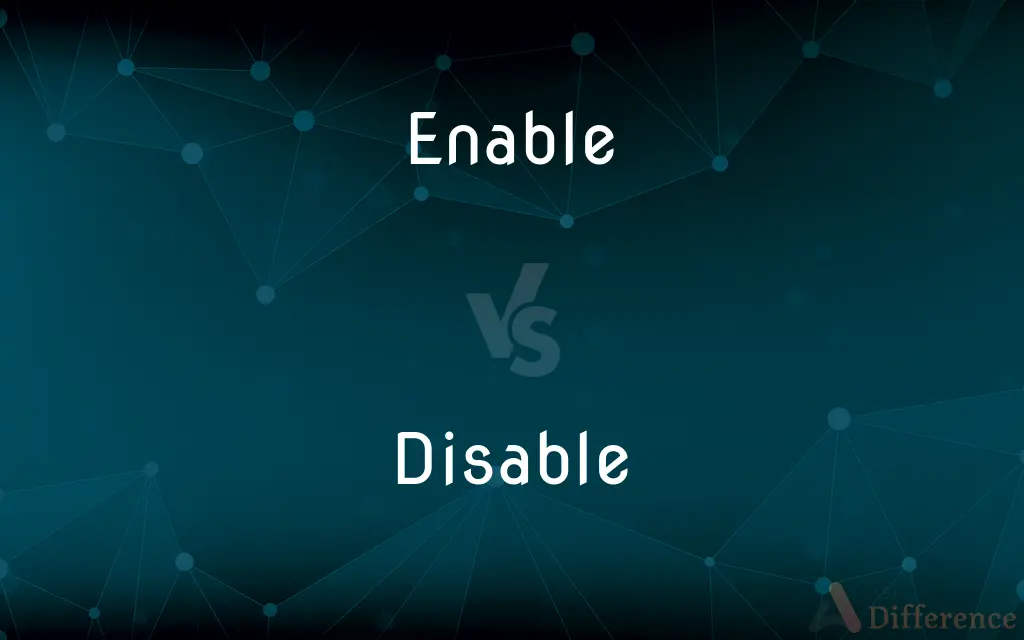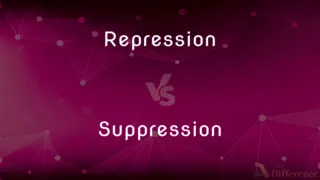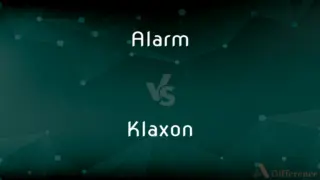Enable vs. Disable — What's the Difference?
By Tayyaba Rehman — Updated on October 6, 2023
Enable" means to allow or make something possible, while "Disable" means to prevent or make something impossible.

Difference Between Enable and Disable
Table of Contents
ADVERTISEMENT
Key Differences
Enable" and "Disable" are two verbs in the English language that signify the act of turning something on or off, respectively. While "Enable" suggests giving power or functionality to something, "Disable" implies taking that power or functionality away. For example, to "Enable" a feature on a device means to activate it, ensuring its proper functioning. In contrast, to "Disable" that feature would mean to deactivate or stop it from working.
Another perspective to consider is the realm of opportunities or abilities. When someone is "Enabled", they are given the tools, rights, or capabilities to perform a specific task or function. On the other hand, to "Disable" someone might mean to hinder or restrict them from performing that same task. This could be due to physical barriers, rules, or any other kind of limitation.
In the world of software and electronics, the terms "Enable" and "Disable" are frequently used. Features or settings can be "Enabled" to allow their use or "Disabled" to prevent their use. For instance, a user might "Enable" notifications to receive alerts but can "Disable" them if they find them bothersome.
One more way to view these terms is through the lens of potential. To "Enable" is to unlock potential, paving the way for something to manifest or take place. Conversely, to "Disable" is to block or halt the potential, ensuring that a particular event or function does not occur.
Lastly, while "Enable" often carries a positive connotation, implying empowerment, "Disable" might be viewed in a negative light, as it denotes restriction or limitation. However, this isn't a strict rule, as context plays a significant role in determining the sentiment associated with each term.
ADVERTISEMENT
Comparison Chart
Definition
To make something operational or possible.
To make something non-operational or impossible.
Connotation
Generally positive (empowerment, activation).
Generally negative (restriction, deactivation).
Usage in Tech
Turn on a feature or function.
Turn off a feature or function.
Grammatical Form
Regular verb, often transitive.
Regular verb, often transitive.
Synonyms
Empower, activate, permit.
Hinder, deactivate, restrict.
Compare with Definitions
Enable
To authorize or permit.
The administrator will enable access to the system.
Disable
To render incapable or powerless.
The injury might disable him from playing the sport.
Enable
To make something effective.
The medicine will enable faster recovery.
Disable
To impair the function or utility of.
The bug will disable the application's key features.
Enable
To give the means or ability to.
The training will enable him to perform the task efficiently.
Disable
To turn off or deactivate.
Please disable the alarms before maintenance.
Enable
To supply with the means, knowledge, or opportunity (to do something); make able
A hole in the fence that enabled us to watch.
Techniques that enable surgeons to repair the heart.
Disable
To deprive of capability or effectiveness, especially to impair the physical abilities of.
Enable
To make feasible or possible
Funds that will enable construction of new schools.
Disable
(Law) To render legally incapable of performing an act.
Enable
To give legal power, capacity, or sanction to
A law enabling a new federal agency.
Disable
(transitive) To render unable; to take away an ability of, as by crippling.
Enable
To make operational; activate
Enabled the computer's modem.
Enable a nuclear warhead.
Disable
To impair the physical or mental abilities of; to cause a serious, permanent injury.
Falling off the horse disabled him.
Enable
To behave in a manner that facilitates or supports (another's abusive, addictive, or self-destructive behavior).
Disable
To deactivate, to make inoperational (especially of a function of an electronic or mechanical device).
The pilot had to disable the autopilot of his airplane.
Enable
To make somebody able (to do, or to be, something); to give sufficient ability or power to do or to be; to give strength or ability to.
Disable
(obsolete) Lacking ability; unable.
Enable
To affirm; to make firm and strong.
Disable
Lacking ability; unable.
Enable
To qualify or approve for some role or position; to render sanction or authorization to; to confirm suitability for.
Disable
To render unable or incapable; to destroy the force, vigor, or power of action of; to deprive of competent physical or intellectual power; to incapacitate; to disqualify; to make incompetent or unfit for service; to impair.
A Christian's life is a perpetual exercise, a wrestling and warfare, for which sensual pleasure disables him.
And had performed it, if my known offenseHad not disabled me.
I have disabled mine estate.
Enable
To yield the opportunity or provide the possibility for something; to provide with means, opportunities, and the like.
Disable
To deprive of legal right or qualification; to render legally incapable.
An attainder of the ancestor corrupts the blood, and disables his children to inherit.
Enable
To imply or tacitly confer excuse for an action or a behavior.
His parents enabled him to go on buying drugs.
Disable
To deprive of that which gives value or estimation; to declare lacking in competency; to disparage; to undervalue.
Enable
(electronics) To put a circuit element into action by supplying a suitable input pulse.
Disable
Make unable to perform a certain action;
Disable this command on your computer
Enable
To activate, to make operational (especially of a function of an electronic or mechanical device).
Disable
Injure permanently;
He was disabled in a car accident
Enable
To give strength or ability to; to make firm and strong.
Receive the Holy Ghost, said Christ to his apostles, when he enabled them with priestly power.
Disable
To make ineffective.
The virus can disable the software.
Enable
To make able (to do, or to be, something); to confer sufficient power upon; to furnish with means, opportunities, and the like; to render competent for; to empower; to endow.
Temperance gives Nature her full play, and enables her to exert herself in all her force and vigor.
Disable
To prohibit or prevent.
The system will disable unauthorized access.
Enable
Render capable or able for some task;
This skill will enable you to find a job on Wall Street
The rope enables you to secure yourself when you climb the mountain
Enable
To activate a feature or function.
You can enable the Wi-Fi from the settings.
Enable
To empower or facilitate.
The grant will enable further research in the field.
Common Curiosities
How does "Disable" contrast with "Enable"?
"Disable" means to prevent, hinder, or make something impossible, the opposite of "Enable".
Can "Enable" be used in a negative context?
Yes, context matters. For example, "enabling bad behavior" is a negative use.
Do "Enable" and "Disable" have synonyms?
Yes, for "Enable" synonyms include empower and activate, and for "Disable", hinder and deactivate.
Is "Disable" always negative?
Not always. For instance, disabling a harmful function can be positive.
Are these terms used in legal contexts?
Yes, such as "enable rights" or "disable access".
Can something be neither enabled nor disabled?
Potentially, if it's in a neutral or default state.
Can both words be used as nouns?
Yes, but less common. Examples are "enabler" and "disability".
Do the words have roots in other languages?
Yes, both derive from Old French and Latin origins.
What does "Enable" mean in general?
"Enable" means to allow, empower, or make something possible.
How are "Enable" and "Disable" used in technology?
They often refer to activating or deactivating features or functions.
Are there antonyms for these words besides each other?
"Enable" can also have antonyms like "restrict", and "Disable" can have "empower".
How are these verbs used transitively?
They often take an object, e.g., "enable a user" or "disable a device".
How should one choose between using "Enable" and "Disable"?
Consider context, desired meaning, and whether you're denoting empowerment or restriction.
How do "Enable" and "Disable" relate to potential?
"Enable" unlocks potential, while "Disable" blocks or halts it.
In which field are "Enable" and "Disable" most commonly used?
They're widely used, but particularly common in technology and software.
Share Your Discovery

Previous Comparison
Repression vs. Suppression
Next Comparison
Alarm vs. KlaxonAuthor Spotlight
Written by
Tayyaba RehmanTayyaba Rehman is a distinguished writer, currently serving as a primary contributor to askdifference.com. As a researcher in semantics and etymology, Tayyaba's passion for the complexity of languages and their distinctions has found a perfect home on the platform. Tayyaba delves into the intricacies of language, distinguishing between commonly confused words and phrases, thereby providing clarity for readers worldwide.














































